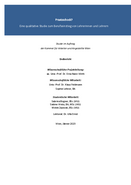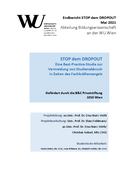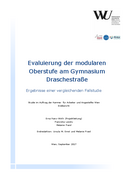Research Projects
Catalog of Measures for Teachers, School Principals, Parents and legal Guardians to prevent or more effectively deal with School Absenteeism and early School Leaving. The Beginning of a new School Culture
2011 - 2012, 2023 - 2024| Duration | 2011 - 2012; 2023 - 2024 |
| funded by | MA 23 - EU-Strategy and Economic Development, Labor and Economics DepartmentChamber of Labor |
The alienation and distancing of students from school usually progresses gradually. Carefully planned preventive action, which should also be part of positive school and teaching development, enables timely professional intervention in this otherwise often hidden process. Through intensive research in international educational science fields, preventive and intervention measures against school dropout were identified and critically evaluated with regard to their usefulness in Viennese schools. Over 100 high-quality individual studies from abroad were selected and analyzed in order to develop recommendations for action aimed at school administrators, teachers, and parents or legal guardians.
The catalog of measures in the second updated and expanded edition of 2024 contains 69 recommendations for action with detailed steps that can be tried out individually or in combination. Based on the specific field of practice, various ways of improving the situation are selected. In this way, unlike fixed programs, greater flexibility, individualization, and autonomy in action can be achieved.
- Handlungsempfehlungen für Lehrende, Schulleitung und Eltern bzw. Erziehungsberechtigte zur erfolgreichen Prävention von Schulabsentismus und Schulabbruch (pdf, 4.22 MB)
- Handlungsempfehlungen für Lehrende, Schulleitung und Eltern zur erfolgreichen Prävention von Schulabsentismus und Schulabbruch (pdf, 895 KB)
First Year of Teaching
2021| Duration | 2021 |
| funded by | Arbeiterkammer Wien |
In the practice shock project, national and international research on the reasons, causes and consequences of the so-called practice shock is processed.
Information about this phenomenon, which shows the discrepancy between training and practice, is of great importance for training institutions and those responsible for school development. Well-tested prevention measures from different countries that are suitable for Austrian schools are presented. The main focus is on building resilience through mentoring and professional learning communities.
Download final report (German)
STOP – DROPOUT
2020 - 2021| Duration | 2020-2021 |
| funded by | B&C Privatstiftung |
A best practice study to avoid dropping out in times of skills shortage.
Abstract (short)
A high-quality university education is a decisive prerequisite for economic growth, labor market development, avoiding the shortage of skilled workers, economic and social innovations and political stability. High drop-out rates are associated with high costs from both an individual and an economic perspective. The diversity of the student population has increased significantly - not least due to the growing number of students who come from families with no university experience, are employed or do not come to the university within two years of obtaining their higher education entrance qualification. It is precisely these so-called non-traditional students who have a significantly higher risk of dropping out. Universities are testing various measures to counter dropouts and extended study times.
The present report offers options and suggestions for such problem solving and organizational innovations.
Final report (German)
Non-traditional students. Transition and resilience (ÖNB)
2020 -| Duration | 2020 - |
| funded by | Anniversary Fund of the Oesterreichische Nationalbank (OeNB) |
This project examines the resilience of non-traditional students. The study is aimed at various degree programs with a focus on technology. A new resilience concept is being developed which, based on Bourdieu's theory, focuses on the interaction between students and the university fields. Participants in working groups (students, tutors, teachers) are examined.
These main research areas are dealt with: Interaction between the habitus of non-traditional students and the field, educational risks and dropping out, resilience and student working groups.
A longitudinal study with a mixed methods approach is carried out.
Learning Hubs: Build Self-Directed Learners in Innovative Learning Environments
2016 - 2018| Duration | Oct. 1, 2016 - Nov. 20, 2018 |
| funded by | Federal Ministry of Education and Research |
The project focusses on the newly implemented learning hub ("Lernbüro") at a school for higher technical education. Research aspects are: individualised and self directed learning, school commitment, school absenteeism and early school leaving, self-efficacy and educational/professional aspirations.
Evaluation modular course system Draschestraße, Vienna
2016 - 2017| Duration | Sept. 1, 2016 - Sept. 1, 2017 |
| funded by | Official Representation of Employees Vienna |
The project focusses on a modular course system ("modulare Oberstufe") at a viennese school. Research aspects are: individualised learning, school commitment, school absenteeism and early school leaving, self-efficacy and educational/professional aspirations of the pupils.
Reducing Early School Leaving in Europe (RESL)
2013 - 2018Teacher Professionalism: The Double Field of Tradition and New Professionalism
2013 - 2015| duration | 2013 - 2015 |
| funded by | OENB |
Schools as culture-bearing institutions. Lessons to be learned. Part III
2011 -| duration | 2011- |
| funded by | Jubilee Fund of the city of Vienna |
Die Schulentwicklung hat im 21. Jahrhundert im Vergleich zu den Jahrzehnten davor an nationaler und internationaler Bedeutung gewonnen. Schulen einer Stadt sind zentrale kulturelle Einrichtungen wie die Oper, Theater, Sportarenen, Messen etc. Sie bestimmen die Attraktivität einer Stadt mit – und zwar nicht nur die Eliteschulen – sondern auch die sogenannten Problemschulen. Die Transparenz hat sich erhöht, d.h. eine Stadt kann ihre ‚Problemschulen‘ nicht mehr ‚verstecken’.Im Forschungsprojekt wird das Ziel verfolgt, internationale Best-Practice-Modelle zu identifizieren, die ‚kostengünstig’, kontextflexibel und ohne gravierende strukturelle Systemänderungen an den Wiener Schulen installiert werden können und zu nachhaltigen Erfolgen führen.
Quo Vadis Education? A qualitative longitudinal Study of Early School Leavers Habitus
2009 - 2014| Duration | 2009 - 2014 |
| funded by | Chamber of LaborMA 23 - EU-Strategy and Economic Development, Labor and Economics Department |
The theoretical part of this qualitative study summarizes the results of international research on the causes and effects of early school leaving. The empirical part presents the empirical results obtained from 25 qualitative interviews. The data was evaluated using Pierre Bourdieu's educational sociology theory. With regard to the coping strategies of young people after dropping out of school, a preliminary habitus typology emerged, which is further differentiated in the longitudinal study. The results underscore the importance of social capital (Bourdieu) for educational trajectories.
Learning from Second Chance Education: Making Use of Good Practices in Second Chance Education to Prevent Early Leaving t Early School Leaving
2012 - 2013| Duration | 2012 - 2013 |
| funded by | Ecorys UK |
The project describes the importance of second-chance education for the Austrian education system and the various options available for obtaining a school-leaving certificate. The empirical study focuses on second-chance school projects that enable students to obtain their compulsory school-leaving certificate.
Using a guided interview, students, teachers, school principals, educational and career counselors, and decision-makers in the education system were surveyed on the topic. The aim was to identify successful elements of the projects and analyze them in terms of their transferability to the regular education and training system (Perspectives on Transferability).
Based on both P. Bourdieu's Theory and international Programs, the Professionalization of Teachers is conceptualized in Terms of School and Training Dropout Prevention and Intervention.
2011 - 2012| Duration | 2011 - 2012 |
| funded by | Federal Ministry of Education, Arts and Culture |
Pierre Bourdieu's theory and the international educational research based on it were used as a framework for analyzing the research results on prevention and intervention in school and training dropout, as well as the attitudes, behaviors, and practices of teachers and their professional development. In addition, a preliminary typology of teachers was created using theory generation and data analysis based on grounded theory and semi-structured, problem-centered interviews.
The results of the teacher interviews show that the professionalization of teachers with regard to prevention and intervention in school disengagement and dropout has been insufficient to date. A differentiated awareness of this deficiency could only be reconstructed from the statements in the interviews in very few teachers and only to a limited extent. Through the review of international specialist literature, qualitative research, and a selection of best practice examples, insights and suggestions for the development of differentiated models for improving the professionalization of teachers were conveyed.
The Challenges of ethnically segregated Schools located in densely populated urban Areas - the Vancouver Model. Searching for a Good-Practice Model for Vienna. Part II
2010 - 2011| Duration | 2010 - 2011 |
| funded by | Jubilee Fund of the City of Vienna |
The study builds on initial findings from the project "Socio-spacial and School Segregation Tendencies in a densely populated Area of Vienna: Lessons to be learned from the Example of Berlin". The comparative case study highlights good practice solutions for dealing with the challenges of ethnically segregated school locations that are practicable and economically feasible for the city of Vienna.
The comparison of good practice models between two countries (Austria and Germany), which are ranked in the middle range according to the PISA ranking, and the PISA “top country” Canada has produced interesting research results. Data was collected using ethnographic survey methods (document analysis, semi-structured guided interviews) at the three school locations Vienna, Berlin and Vancouver. A feasibility study of a foreign good practice model was developed for the Vienna school location.
Socio-spacial and School Segregation Tendencies in a densely populated Area of Vienna: Lessons to be learned from the Example of Berlin. Part I
2010 - 2011| Duration | 2010 - 2011 |
| funded by | Jubilee Fund of the City of Vienna |
Schools play an important role in shaping social selection and segregation processes and should be organized and professionalized in such a way that they help to realize the core values of a democratic society, such as freedom, equality, and integration. Based on a study by leading international educational scientists (Bryk et al.), qualitative interviews were conducted with school principals, teachers, school doctors, and school social workers at three middle schools/secondary schools in the metropolitan areas of Berlin (Neukölln) and Vienna (Rudolfsheim Fünfhaus).
The aim was to find out from the respondents how, despite strong segregation tendencies, negative developments such as school disengagement and dropout rates could be reduced and the academic performance of students improved at the respective school locations. The results of the interviews were examined in terms of internationally recognized “good practice criteria.”
Quo Vadis Education? A qualitative Study of Early School Leavers' Habitus
2009 - 2010| Duration | 2009 - 2010 |
| funded by | Chamber of Labor |
The theoretical part of this qualitative study summarizes the results of international research on the causes and effects of early school leaving. The empirical part presents the empirical results obtained from 25 qualitative interviews. The data was evaluated using Pierre Bourdieu's educational sociology theory. With regard to the coping strategies of young people after dropping out of school, a preliminary habitus typology emerged, which is further differentiated in the longitudinal study. The results underscore the importance of social capital (Bourdieu) for educational trajectories.
Education Sciences Group



